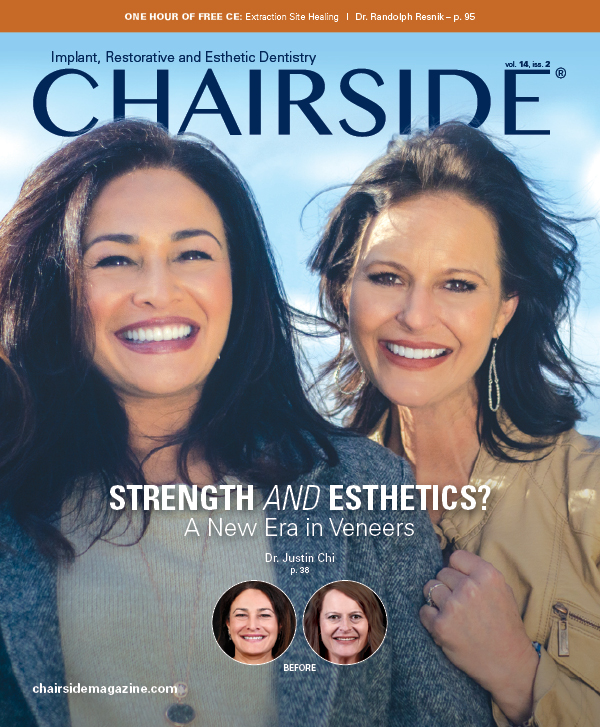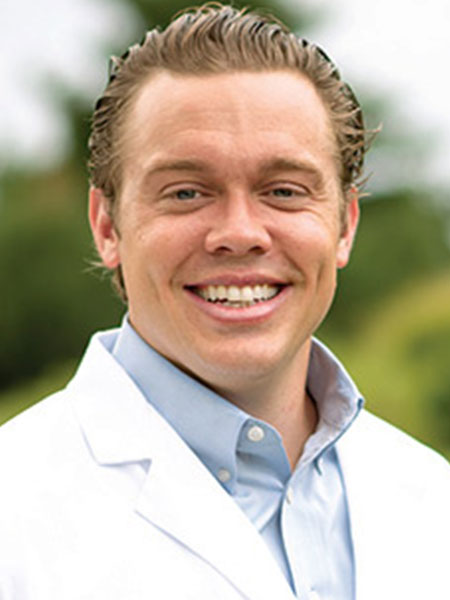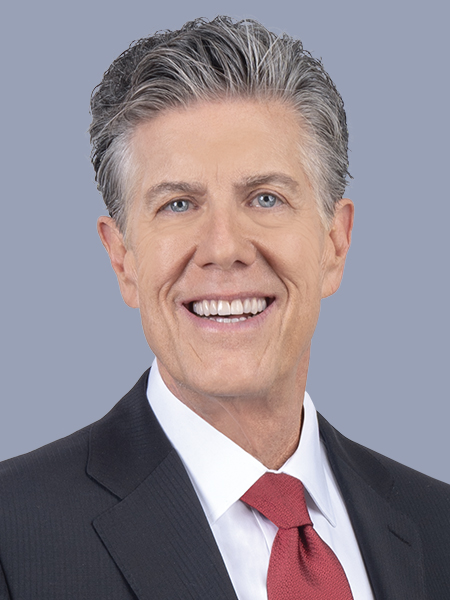Interview with Philip Gordon, DDS
Dr. Philip Gordon is a devoted advocate for the placement of implants by general dentists. Since incorporating implant surgery within his own practice several years ago, he has found that more patients are able to afford and receive care. This inspired him to start his popular “Dental Implant Practices” podcast, which he uses as a platform to connect dentists with the resources they need to expand the implant services they offer. Here, he explores the benefits of offering the full circle of implant care in the general practice and shares tips for developing the skills needed to thrive in the field of implantology.
DR. NEIL PARK: Can you tell us a little bit about your early life? Where did you grow up and how did you end up in dentistry?
DR. PHILIP GORDON: I grew up in Kansas City, Missouri, went to the University of Missouri for my undergraduate, and then did my studies in dental school at the University of Missouri-Kansas City. My father was a dentist, and being around that early in my life had a big impact on my decision to pursue dentistry as a career. Of course, back then I didn’t have any idea what I’d be getting into. You watch Dad play around with teeth and think everything’s great, and then you get into dental school and realize, wow, there’s a lot more to this. But now that I’ve got the hang of things, it’s a lot more fun, especially since I got involved with implants.
NP: Did you open a practice right out of dental school?
PG: I joined my father’s practice right out of school, so I had a built-in GPR. He trained me on procedures and a little bit on the business side of things. His practice was pretty heavily cosmetic-based, and when I got out of school I thought that might be what I wanted to do. But after practicing for a while, I realized my passion went beyond esthetics, and I was more interested in the surgical part. So implantology — placing and restoring implants, replacing hopeless teeth and failing dentition — is really my niche and what I enjoy most these days, though I continue to take joy in general restorative and cosmetic procedures.
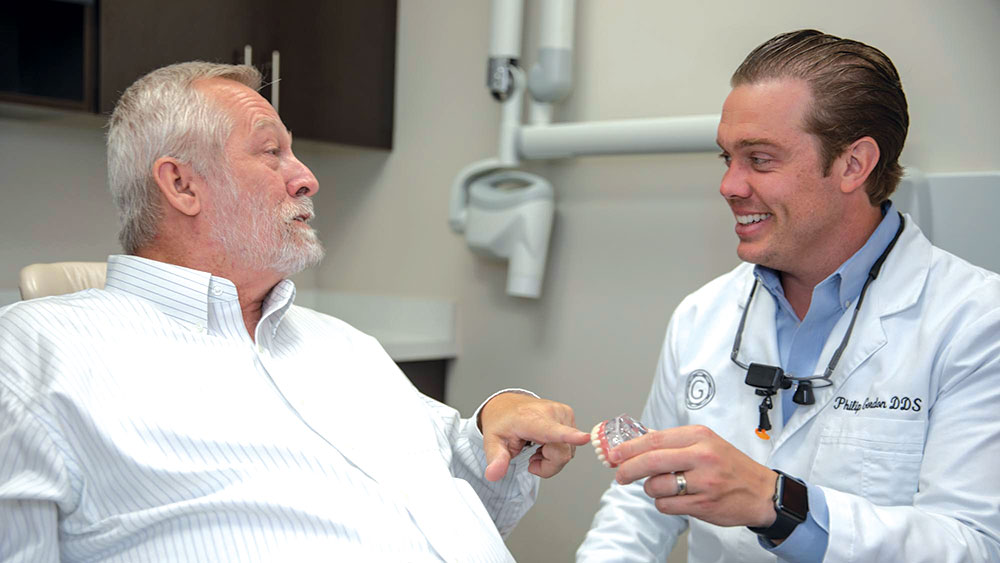
When he’s not treating patients, Dr. Philip Gordon devotes his professional time and energy to promoting the placement of implants in the general practice. His popular “Dental Implant Practices” podcast features experts from various areas of the profession and aims to connect dentists with the resources they need to develop their clinical skills and grow their practices.
NP: When you got into implants, you really went all in on it. Your “Dental Implant Practices” podcast is making a big impact in motivating other general dentists to embrace implants, and I’ve noticed that there are now thousands of members in your associated discussion group on Facebook. I know you’ve even studied with Dr. Jack Hahn in his practice. How did you get so involved with implantology?
PG: I noticed there was a need for it in my practice. I was seeing a lot of failing teeth, and patients were coming in who needed more than I was able to provide. I’d refer these patients out and they either wouldn’t follow through or couldn’t afford to receive an implant from a specialist. So I thought, who better to provide these services than me, the dentist they know and trust?
But I knew I needed to get the training, the right equipment, and the right partnerships and mentorships. Eight to 10 years ago, those resources were somewhat limited. There are more opportunities now, but at the time, there were a lot of barriers for the general dentist trying to get into implantology. I’m now at a point where I’m trying to break down those barriers and help dentists grow the implant services in their practices.
That’s what led me to start the podcast, the Facebook group and some of the other things that I’m doing to connect general dentists with the implantology resources they need. For me, the process I went through was: Go to every course, buy every piece of equipment and try everything. I want to pass on all that I’ve learned to other people who are getting into the field.
Who better to provide these services than me, the dentist they know and trust?
NP: But there is a commitment, right? The good training programs cost money and take time out of your office. Somewhere along the line, you have to make the commitment that you’re willing to sacrifice to make this part of your practice. How did you come to that decision?
PG: It was something that I knew I had to do. I took a few of the basic implant courses, and I tried some of those things in my office. I found all of it exciting and terrifying at the same time. I wanted to learn from the best. I knew I needed to get that experience from people who have been there before, and I’d suggest the same for other dentists who want to offer implantology in their practice. It’s people like Dr. Hahn and institutions like the Misch Institute, the American Academy of Implant Dentistry (AAID) and the International Congress of Oral Implantologists (ICOI) that have built their foundations on training and helping others. I remain involved with those organizations, and I recommend other dentists who are interested in implantology do the same.
NP: Can you talk about the time you spent in the office of Dr. Hahn? What was that like? As you’re aware, this is the guy who invented a lot of what we use in implantology today.
PG: It was amazing. I interviewed him for the podcast, and we hit it off really well. I wanted to see how the master does it, so I just invited myself up there and he said, “I’d love to have you.” I had the opportunity to hang around his practice and watch him do his thing all day. The way he works is an art form. He’s an exceptional teacher, a fabulous mentor and an amazing person. Learning from all these different leaders is important because there’s more than one style of dentistry. It’s all about finding the style that best fits you. Considering all the dentists Dr. Hahn has helped develop their skills as implantologists, he is a great person to learn from.
NP: You know, when he started, this wasn’t a commonly taught thing. If you thought the education was tough, you can imagine how challenging it was 40 years ago.
PG: Absolutely. It’s definitely easier nowadays. But the challenge today is where to go. There are almost too many options and too many implant systems. It can be difficult to find what’s best for the individual dentist. It’s about filtering through the noise and finding out: Who’s going to be a good partner for me? Who can I rely on? Who can I trust? What’s real information and not just a sales pitch? Who out of all these companies is providing good products, good training courses and good mentorship? It’s hard for the young practitioner to figure out where to go and what to do.
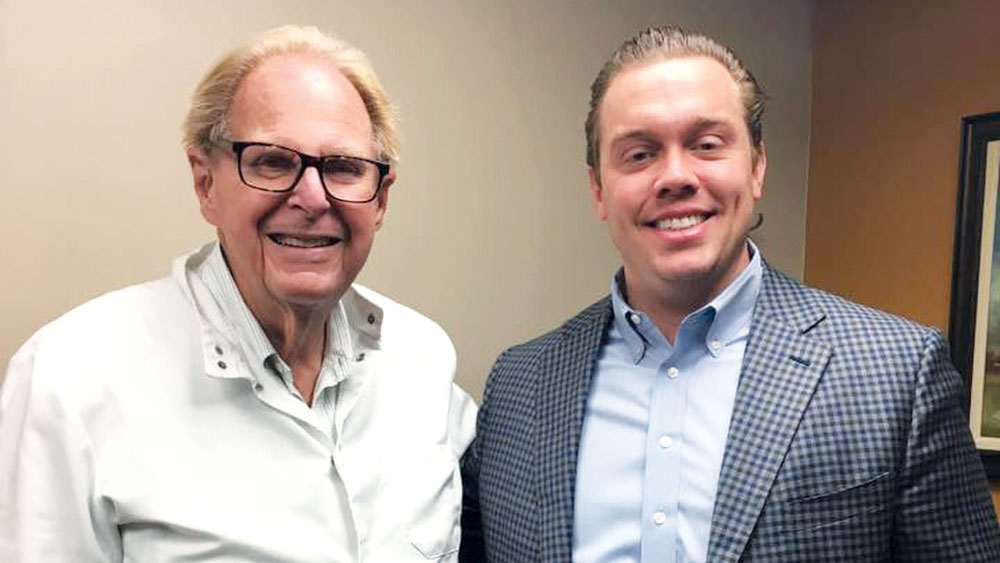
Dr. Gordon with Dr. Jack Hahn, whom he visited at his practice in Cincinnati, Ohio, after interviewing the renowned implantologist on his podcast. “Considering all the dentists Dr. Hahn has helped develop their skills as implantologists, he is a great person to learn from,” said Dr. Gordon.
NP: Was that the impetus for starting your podcast?
PG: It absolutely was. I’ve kind of seen and done it all at this point. I’ve used a lot of the different implant systems out there. I’ve been to most of the major implant organizations and CE providers. I have some good contacts and know who’s doing what. I like to look at everything and evaluate who’s putting a good product out there, who’s got a good course, who’s got a good system, who’s got a great lab, who’s got the good cone beams, and all the rest. I put all those pieces together for dentists, whether it’s someone who’s just entering the field of implantology or someone who’s experienced and looking to do more. I’m trying to cut through the weeds and let other dentists know which companies have good people, which have good products, and who they can trust.
NP: “Cut through the weeds” is the exact phrase I was going to use. When I hear you do your interviews — and these are with some of the top people in implant dentistry — that comes across as your goal: to simplify the vast assortment available for clinicians to choose from and help them make informed decisions. I think it’s great. Can you tell our readers a little bit about some of the people you’ve interviewed on your podcast?
PG: I like to interview a wide variety of people. As we discussed, I interviewed Dr. Jack Hahn. I have interviewed presidents of companies like Osstell, and I’ve interviewed some of your folks on the manufacturing side at Glidewell Dental. I’ve spotlighted some of the CBCT companies out there and the products they provide, as well as a few of the surgical guide manufacturers. We’ve got some “how to” episodes coming up about treatment planning and case presentations for your patients.
So I like to look at the whole general practice. Placing implants is only one part of that. You have the team component, the dental lab, technology, and so on. You have to make all these diverse resources come together in order to provide that full circle of implant care in the general practice. So how do you put that together for the dentist in a way that makes sense, so they can integrate that information in their practice and make full use of it to benefit their patients and their business? That’s what I’m trying to do with my podcast.
NP: I have to compliment you, because the people that you’re interviewing and getting these answers from are all top authorities. They really know what they’re talking about. And you’ve kept it as neutral and uncommercial as a situation like that can be. I know when you had on Grant Bullis, who’s vice president of manufacturing here at Glidewell, that was a tutorial on titanium. He went in-depth on the different grades of titanium available, the manufacturing methods, and the various surface treatments for dental implants. That kind of information is hard to come by and extremely valuable to the clinician. I’ve been in this field a long time, and I’ve learned a lot from listening to the podcast.
PG: That’s great to hear. I’ve always been drawn to the various aspects that make implant dentistry such a fascinating, effective part of dentistry. It’s incredibly fun and informative to dig through each little detail and question people who have huge amounts of knowledge in their respective fields. Then I realized that other people have an interest in that, too. As general dentists, we’re clinicians, and in a way, we’re scientists and sculptors and all these other things. But we’re not specialists in any one area. So I like to learn from people who are experts and share that with other dentists. This person knows everything about implant manufacturing, this one knows everything about surgical guides, and so on. You can get their top takeaways, filter through it, and learn things that you can bring into your practice for the benefit of your patients.
NP: You have a good way of asking questions that cut right through to the truth. So I understand why you put this podcast together, but how did you popularize it and get people out there to subscribe?
PG: I interviewed some friends of mine who have big followings, like Dr. Gary Takacs, Dr. Justin Moody and various other people who are leaders in their specific roles in the world of implant dentistry. I knew there was a need for this type of content, and I assumed it would succeed at some point from people stumbling upon it or hearing about it and liking what we’re doing. We’ve been at it a couple of years and it’s growing. My goal is just to keep it as noncommercial as possible and provide real, unbiased information. I think people like the fact that nobody is paying for the podcast or selling anything on there. Same with the “Dental Implant Practices” Facebook group, where we’re not running any ads. It’s just information that people want and need. It’s worked out well.
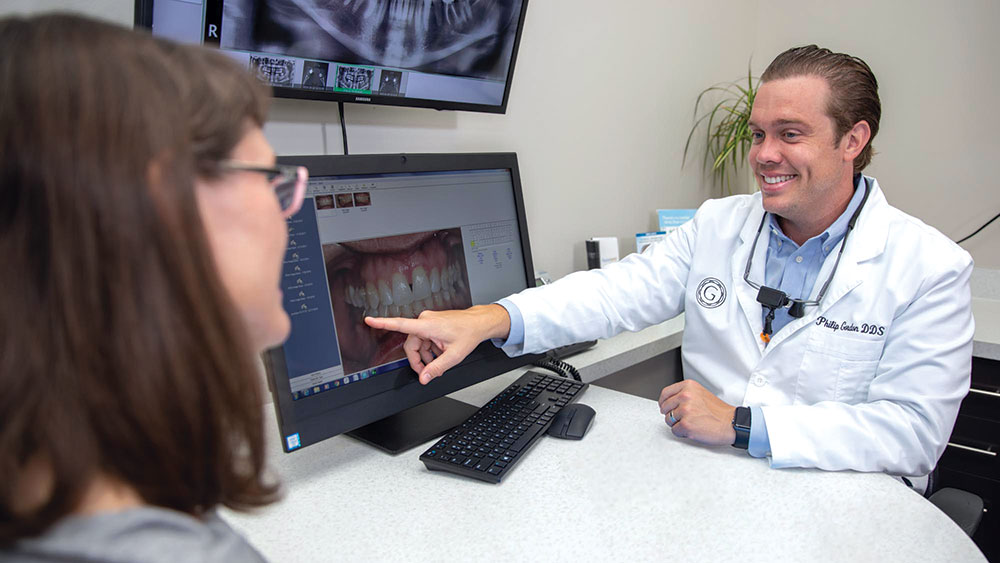
Since adding implant placement to the services offered by his practice, Dr. Gordon has seen patient acceptance of implant treatment surge due to the lower cost and the comfort level many people have with their general dentist.
NP: So what’s in the future? Where do you want to take this?
PG: I just want to continue answering the questions I set out to at the beginning: Where is implant dentistry headed, and how can more general dentists get involved? Let’s try to answer those questions for dentists who want to incorporate or learn more about implantology and for those who continue to push the boundaries of the field. For the good of patients, these doctors need to connect with the right resources. I’m trying to create a mentorship, fellowship and community program where people can come and not be judged, learn from each other, and share their best practices. Hopefully, it will help dentists who work with implants grow, learn and make progress on their path.
NP: That’s a really worthwhile goal and one we support here at Glidewell. Switching topics a bit, as a digitally savvy dentist who helps other clinicians develop their practices, what advice can you offer on using their online presence to grow their business?
PG: It’s important to have a strong online presence. This is especially true for younger doctors who are trying to grow their practices. That starts with a website that portrays the kind of office you have and the types of patients you serve. When prospective patients visit your website it should be clear whether you can meet their needs and provide the services they’re looking for. The overall look, feel and focus of your website should illustrate the kind of practice you have. You should describe the services you offer in very plain terms so it’s obvious that they can give you a call to get the help they need. The photography needs to be up to date and eye-catching. People are basically shopping at that point, so you need something that will grab their attention.
If you offer implant treatment, you really need to emphasize that service because it’s a big advantage to have in a general practice. You should spell out the problems you can solve for the patient, whether it’s the replacement of one tooth, two teeth, or the full arch. You can market your practice as a comprehensive, one-stop shop for implant treatment, which many patients will appreciate. Either way, the more competent you can get at full-service implant care, the better and more effective your marketing can become. Training and getting up to speed should be the first goal, then you worry about marketing.
NP: What about online reviews? I noticed you feature those quite prominently on your website, including several well-made videos.
PG: Cultivating online reviews is incredibly important. Once people are on your website, there’s nothing more powerful than video testimonials. You want to sell the life-changing outcomes you can deliver, and no one can speak to that better than your existing patients. Find patients who have had a very positive experience with your practice. Reach out and ask them to come in and do a video. Have them sign consent forms, and I strongly suggest using a professional to shoot the video. It’s an expense that pays for itself and then some. You’ll get the lighting you want, and it will look professional. Having it professionally done really helps deliver the power and emotion you’re going for when you’re trying to capture new patients.
There are three types of videos I suggest. First, there’s an introduction video that shows your practice’s philosophy. This should be one of the first things people encounter on your website so they can learn what you’re about quickly. Next, you should shoot a video where you’re the doctor speaking about the specific procedures you perform in your practice. The third is patient testimonials, which will often be the thing that gets new patients through the doors of your practice. The more visual you can be, the better. The purpose of the website is to inform, but it should be more about making an emotional connection. Video works better than words when it comes to describing procedures and how you can positively impact your patients’ lives.
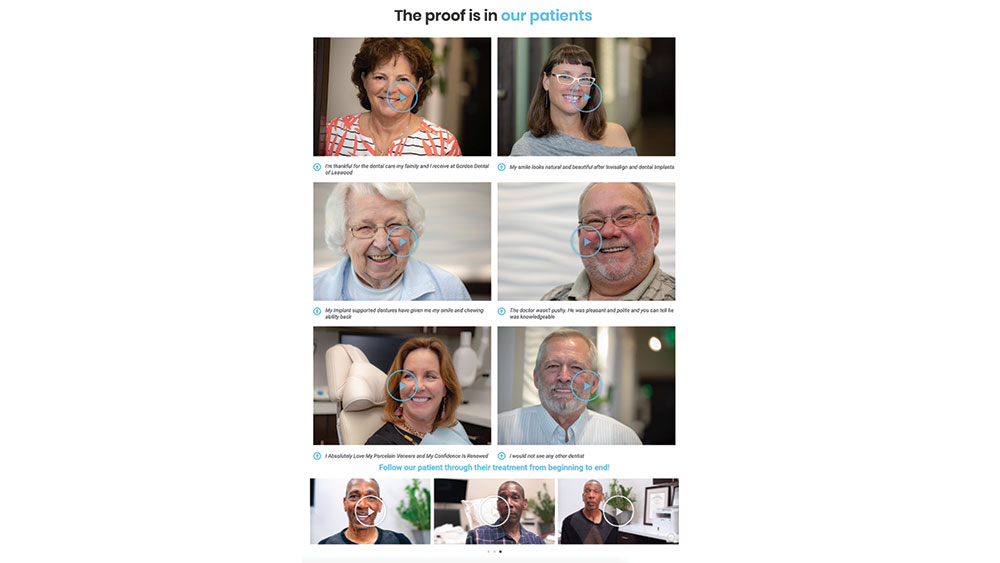
According to Dr. Gordon, patient testimonials — ideally in video form — are a crucial website feature that can make the emotional impact needed to drive new patients to your practice.
NP: So if there’s anybody out there who isn’t yet a subscriber to your podcast, how do they go about it?
PG: So I’ve got a web page — dentalimplantpractices.com — where you can find my podcast, see information on the programs I offer, link to my Facebook group and connect with a bunch of resources that I think are important for general dentists. Of course, you can subscribe on YouTube and watch some of my videos there. You can also go to iTunes or the various other places where podcasts are available.
NP: I certainly look forward to future podcasts. Thanks so much for spending some time with us.
PG: It’s my pleasure. Thank you.

